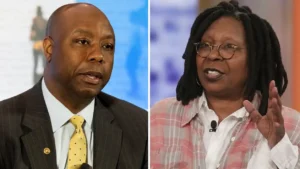
In an unfolding drama that captures the intersection of celebrity, politics, and personal reputation, Whoopi Goldberg, the acclaimed actress and co-host of “The View,” has launched a $10 million lawsuit against Senator Tim Scott. The lawsuit stems from a contentious episode where Scott allegedly branded Goldberg as “toxic,” a remark that has since spiraled into a significant legal and public relations battle.
Whoopi Goldberg, a figure synonymous with outspoken opinions and a no-holds-barred approach to social and political issues, has long been a staple on American television. Her career, which spans decades in both film and television, has not only earned her numerous accolades but also a platform that she has consistently used to advocate for various causes and viewpoints. It’s within this context that the alleged comment by Senator Tim Scott, a leading Republican figure known for his conservative stance on many issues, has struck a chord.
The incident, which quickly made headlines, has opened up a Pandora’s box of debates surrounding free speech, the bounds of public discourse, and the impact of words on an individual’s reputation. According to Goldberg, Scott’s “toxic” remark was not just a personal affront but a damaging assertion that has had a profound effect on her professional and personal life. This lawsuit, therefore, is not merely a quest for legal redress but a statement against what Goldberg perceives as defamation.
At the heart of Goldberg’s lawsuit is the claim that Scott’s comment was not only unfounded but malicious in intent, designed to demean her character and integrity in the public eye. The legal documents detail the immediate fallout from Scott’s remark, highlighting a surge in negative press, social media trolling, and professional setbacks that Goldberg attributes directly to the senator’s words. In seeking $10 million in damages, Goldberg’s legal team aims to set a precedent about the power of words and the accountability of those in the public sphere.
Senator Tim Scott’s response to the lawsuit has been one of staunch denial of any wrongdoing. His representatives have framed the comment as a critique of Goldberg’s political positions rather than a personal attack, emphasizing the senator’s right to free speech. This defense raises critical questions about the line between personal defamation and political commentary, a boundary that is often blurred in the heated arena of public debate.
The lawsuit has ignited a firestorm of public opinion, with supporters rallying around both figures. Goldberg’s advocates argue that the lawsuit is a necessary step in holding public figures accountable for their statements, especially when those statements have tangible consequences on someone’s life. On the other hand, Scott’s supporters see this as an attack on free speech, arguing that political figures should be free to express their opinions without fear of legal retribution.
This legal battle goes beyond Goldberg and Scott, touching on broader themes that resonate in today’s society. It challenges us to consider the weight of our words, the responsibilities of those with a public platform, and the mechanisms available for individuals to protect their reputations. Furthermore, it poses significant questions about the role of the legal system in mediating disputes that stem from public discourse.
As the lawsuit progresses, it promises to be a landmark case that could have far-reaching implications for how defamation is understood and litigated in the context of public figures and political discourse. Legal experts and commentators are closely watching the developments, anticipating the potential legal precedents that could emerge from this high-profile case.
Regardless of the outcome, Whoopi Goldberg’s lawsuit against Tim Scott is a reflection of the complex, often contentious nature of public dialogue in the digital age. It serves as a reminder of the delicate balance between free expression and the protection of individual dignity and reputation. As the case unfolds, it will undoubtedly continue to spark debate, compel introspection, and, perhaps, redefine the boundaries of what it means to speak freely in the public square.
In conclusion, this lawsuit is not just about a dispute between two prominent figures; it is a microcosm of the larger conversations happening in society about dignity, respect, and the power dynamics at play when words cross the boundary from public critique to personal harm. As we await the legal resolution, the court of public opinion remains in session, deliberating on issues that will have a lasting impact on the fabric of public discourse.